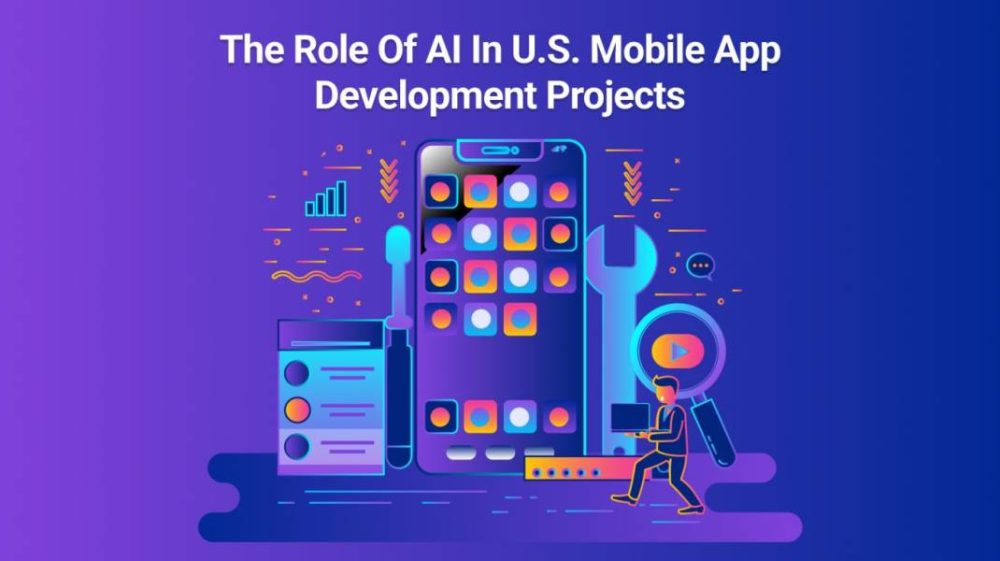The mobile app development landscape in the United States has evolved dramatically over the last decade. What once began as a focus on utility and design has now transformed into a more intelligent and personalized user experience, thanks largely to the adoption of AI in mobile app development.
As U.S.-based businesses continue to invest in digital transformation, AI is becoming a cornerstone technology in mobile app development.
In this blog, we’ll explore how AI development services is revolutionizing mobile app development in the United States—from improving user experience to enhancing backend operations—and why it’s crucial for startups and enterprises alike.
Why AI Is Integral to Mobile App Development in the U.S.
With an increasing dependency on mobile apps for everything from shopping to healthcare, businesses are under constant pressure to deliver smarter, faster, and more personalized experiences. AI addresses these demands by automating processes, analyzing data in real time, and delivering actionable insights.
U.S. app developers are leveraging AI to:
- Enhance user engagement and retention
- Deliver predictive analytics
- Improve app security
- Provide real-time support via chatbots.
- Enable smart automation and personalization.
These capabilities are no longer just “nice to have”—they’re becoming a competitive necessity.
Key Areas Where AI is Transforming U.S. Mobile App Development
Here are several key roles of AI in mobile app development services:
1. Personalization at Scale
One of the biggest selling points for any mobile app is how well it understands and serves its users. AI enables U.S. developers to create hyper-personalized experiences by analyzing user behavior, preferences, and historical data.
For example:
- E-commerce apps use AI to recommend products based on browsing history and purchasing behavior.
- Streaming apps like Netflix or Spotify use AI algorithms to personalize content suggestions.
- Healthcare apps adapt fitness or medication reminders based on individual routines.
In essence, AI helps create apps that evolve with users, increasing stickiness and retention rates.
2. Voice Assistants and Natural Language Processing (NLP)
Voice technology has seen massive adoption in the U.S. As more users grow accustomed to interacting with devices using voice, mobile app developers are integrating AI-powered NLP (Natural Language Processing) to enhance accessibility and usability.
- Voice search features improve convenience and cater to users with disabilities.
- AI chatbots interpret and respond to customer queries using NLP, offering instant resolutions.
- Voice-based commands streamline tasks in productivity or smart home apps.
NLP-driven apps not only improve engagement but also expand user demographics by including non-tech-savvy and visually impaired users.
3. AI-Powered Chatbots and Virtual Assistants
AI-based chatbots are revolutionizing customer service in mobile apps. Modern AI tools for mobile app development:
- Understand user intent
- Offer 24/7 support
- Learn from user interactions over time.
In the U.S., businesses in industries like retail, banking, and healthcare are increasingly adopting chatbot integrations to reduce operational costs while improving service efficiency. These bots are trained on diverse data sets to handle everything from booking appointments to processing refunds.
4. Predictive Analytics for Smarter Decision-Making
Predictive analytics, driven by AI, allows mobile apps to anticipate user actions and deliver proactive solutions. By analyzing large volumes of real-time data, AI can predict:
- What products might they buy next?
- Which content will they engage with the most
For example, fitness apps use AI to suggest workout plans based on past behavior and progress, while finance apps offer smart budgeting tips or investment recommendations.
In the U.S., where data-driven decision-making is foundational to business success, this capability offers a competitive edge.
5. Enhanced Security and Fraud Detection
Security risks with AI are a major concern for mobile app users, especially in sectors like fintech, e-commerce, and health tech. AI is playing a vital role in enhancing data security in AI through:
- Facial and voice recognition for biometric authentication
- Behavioral analysis to detect suspicious activities
- Machine learning for mobile apps that flag fraudulent transactions in real-time
U.S. companies are integrating AI to comply with data protection regulations like HIPAA (for healthcare) and CCPA (for consumer data), ensuring both GDPR compliance and user trust.
6. Smart Automation in Backend Processes
AI doesn’t just enhance the user interface—it also optimizes backend operations. Developers in the U.S. are using AI tools and frameworks to:
- Auto-generate code snippets
- Conduct automated testing and debugging.
- Monitor server performance
- Manage large-scale databases
This leads to shorter development cycles, fewer bugs, and faster time-to-market—essential factors in the fast-paced U.S. tech landscape.
Case Studies of AI in U.S. Mobile App Development
1. Starbucks
This app leverages AI technology for personalized recommendations and loyalty rewards. The app analyzes user data to recommend drinks, send push notifications about nearby offers, and track customer preferences. It leads to increased in-app engagement and customer satisfaction.
2. Capital One’s Eno
Capital One’s AI assistant, Eno, offers real-time insights and alerts through the bank’s mobile app. It uses NLP to understand customer queries and can notify users about suspicious activity, track subscriptions, or provide billing reminders—all via a simple chat interface.
3. Replika
Replika is an AI chatbot app developed in the U.S. that uses advanced AI to simulate meaningful conversations. It adapts to user input over time, becoming a personal mental wellness companion for users who need someone to talk to. This app exemplifies how AI tools for mobile app testing can meet emotional and psychological needs through mobile technology.
Challenges in Implementing AI in U.S. Mobile Apps
Despite the benefits, integrating AI into mobile app development is not without its challenges:
- High development costs: AI-powered app development requires data scientists, ML engineers, and specialized infrastructure, which can be expensive.
- Data privacy concerns: With strict regulations like CCPA and HIPAA, developers must ensure that user data is anonymized and secure.
- Complexity in training models: Creating accurate AI models requires vast datasets and continuous training, which adds to development time.
- Limited AI-ready infrastructure: Not all businesses have the resources or platforms required to implement advanced AI features with app performance.
However, many of these challenges can be mitigated by using AI-as-a-Service (AIaaS) platforms like AWS AI, Google ML Kit, or Microsoft Azure AI.
Future Trends: What’s Next for AI in Mobile App Development?
Looking ahead, the U.S. mobile app industry will likely experience even deeper integration of AI technologies. Some emerging trends include:
- AI-generated UI/UX designs that adapt in real-time to user behavior
- Emotion recognition in apps for mental health, gaming, or customer service
- AI-powered app localization to cater to diverse U.S. populations with different languages and dialects
- Federated learning for privacy-preserving AI model training on user devices
- Edge AI for running AI models directly on smartphones without relying on cloud connectivity
With the emergence of 5G and edge computing, these AI innovations will become even more powerful and efficient.
Conclusion: AI is the Game-Changer for U.S. App Developers
AI is no longer a futuristic concept—it’s a present-day necessity in mobile app development across the United States. From delivering hyper-personalized experiences to automating backend operations, AI is transforming how apps are built, function, and interact with users.
As U.S. businesses continue to invest in digital products, incorporating AI is not just about keeping up with trends—it’s about future-proofing your mobile app strategy. Developers and companies that embrace AI today are positioning themselves to lead tomorrow.
HedgeThink.com is the fund industry’s leading news, research and analysis source for individual and institutional accredited investors and professionals



































